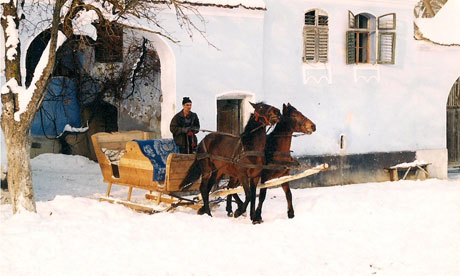
Lying in valleys between deep oak and beech forests, and dominated by vast castle-like churches which tower above the terracotta roofs of the houses that cluster around their walls, the Saxon villages of Transylvania have a fairytale quality about them. From the church bastions, looking south over the forest, on clear days you can see the ragged, snow-covered ridge of the Carpathian mountains. This time last year, in one of these Saxon villages, not far from the medieval town of Sighisoara, a small Gypsy boy was waiting for me at Christmas.
The Saxon lands stretch over a large part of Central Romania, and are so called because of the northern European immigrants who settled here in the 12th century. For over 800 years they stayed, but then, after the collapse of the Ceausescu regime when the borders opened, the descendants of the original settlers packed their bags en masse and departed for Germany. Within a year, villages once populated by several hundred Saxons were largely abandoned, and before long the Gypsies had taken their place. Now, instead of Germanic orderliness there is a degree of mayhem, and with it splendid rabbles of happy Gypsy children rushing about and playing in the village squares. One of these children is my five-year-old son, Constantin.
When I arrived there on 23 December last year, Constantin ran up to me, threw his arms around my neck and told me, breathlessly, of Father Christmas's imminent arrival. I knew that in Romania it was usually Saint Nicholas who, on the night before 6 December, put a few simple presents and sweets into shoes the children had left out on the verandas of their houses (or alternatively a stick intended for a beating if the child had been naughty during the year).
Indeed, in the area of the Maramures, in the north of Romania, where I had lived for four years in the late 1990s, Father Christmas did not figure in Christmas celebrations at all.
But here, further south, Father Christmas had to some extent existed in the communist era (oddly, perhaps, for such a western commercial idea), and now he was beginning to take over. I rather preferred the simple and ancient St Nicholas's day traditions of sweets in shoes, but seeing Constantin's eyes light up with excitement it was clear I had little choice but to go along with the modern imposter, and so I decided at least to make the occasion as memorable as possible.
I had an old sleigh in a barn, a real, wooden sleigh of the one-horse open variety. It had been in good working order a year or two before when I slid in it across the glittering snow in the moonlight. But having brushed off the hay, dust and chicken feathers, I found that Constantin's Gypsy uncles had since stripped it of all of its useful moving parts to use to repair their carts. These would have to be rapidly replaced.
There was much hammering and chiselling in the barn, while in the house I found some old bells I had purchased over the years at animal markets from itinerant pedlars, and tied them to the harness. I then secretly cobbled together something that resembled a Father Christmas outfit. One of the villagers pulled it on, along with some sheep's wool for a beard.
By 8pm on Christmas Eve all was ready and the sleigh, pulled by a beautiful chestnut mare, set off into the night, lurching across the snow- and ice-covered tracks to do the rounds of the village children.
I remained with Constantin, watching the wide, white lamplit village square from an upstairs window. All was silent. A few snow flakes fell. "Perhaps Father Christmas has fallen into a snowdrift in the forest," said Constantin sadly.
But then in the distance we could hear the jingling of bells. Constantin looked at me to see if I had heard them too. Could it really be true? Then a minute later, to our inexpressible delight, the sleigh came around the corner, rumbling over the ice and snow into the square.
Constantin's mouth hung open in wonder, but then to our mutual horror the sleigh headed off towards another part of the village. Constantin could not bear it and shouted out at the top of his voice: "Mos Craciun! Father Christmas! We're over here!"
Ever so slowly the sleigh began to change direction, going around the village fountain, then over the wooden bridge, before sliding to a halt underneath our window.
Father Christmas clambered out of the sleigh and looked up.
"So were you a good boy this year, Constantin?" he asked.
"Oh yes," Constantin replied, trying to sound as convincing as possible.
"And have you learnt your Christmas poem?" Father Christmas boomed. The required poem was stammered, presents were given and Constantin was left standing and staring in amazement.
Father Christmas then tramped outside, and from the window we saw him in his sleigh, rushing off at a brisk trot to deliver presents in other parts of the village, bells ringing as he went.
Looking at Constantin's deliriously happy face, I began to realise that Father Christmas was not such a bad fellow after all. Now that I have been converted, the sleigh has already been brushed down and plans are being hatched for him to visit many more families this year.
• Wizz Air (wizzair.com) flies from Luton to Cluj-Napoca from £54 return, including tax. The Mihai Eminescu Trust (020-8962 8621, mihaieminescutrust.org) supports the conservation and regeneration of Transylvanian villages. It organises a Saxon Heritage Trail with stays in village guesthouses costing from £15-£25pp a night. In Sighisoara, the historic Hotel Sighisoara (+40 265 771000, sighisoarahotels.ro) has doubles from €50 a night
William Blacker is author of Along The Enchanted Way, published by John Murray (johnmurray.co.uk) at £8.99

